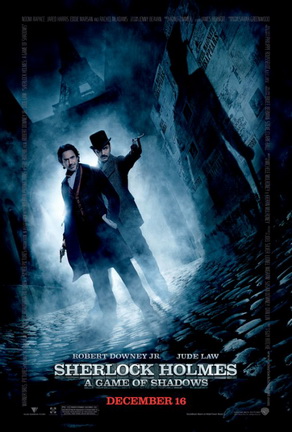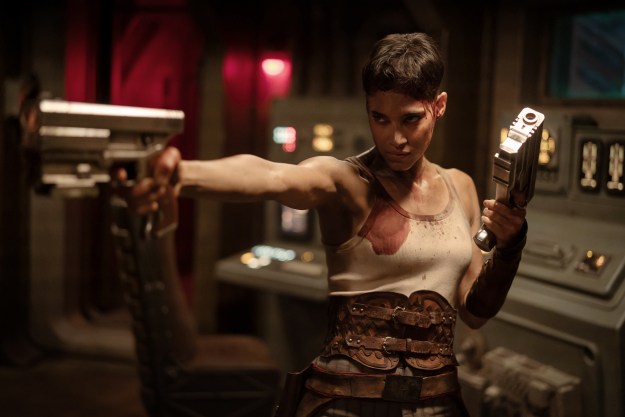 Sherlock Holmes has long been a name that is synonymous with detective work. He examines the evidence, eliminates the impossible, leaving only the truth no matter how improbable. He is the ultimate detective, and has become one of the most adapted characters in the history of film and stage. But despite the numerous actors that have played him, despite the time period each adaptation puts him in, and despite the characteristics that were emphasized, he has always been a thinking man’s champion for truth, justice, and all that jazz.
Sherlock Holmes has long been a name that is synonymous with detective work. He examines the evidence, eliminates the impossible, leaving only the truth no matter how improbable. He is the ultimate detective, and has become one of the most adapted characters in the history of film and stage. But despite the numerous actors that have played him, despite the time period each adaptation puts him in, and despite the characteristics that were emphasized, he has always been a thinking man’s champion for truth, justice, and all that jazz.
Sherlock Holmes: A Game of Shadows mostly does away with that in favor of having Holmes punch people in the face when not busy running from ‘splosions. It is everything ridiculous in Hollywood, and shows a stunning disregard for a beloved character that apparently needed to be dumbed down and actioned up. And yet, it is still an enjoyable move, almost despite itself.
A Game of Shadows is not really a Sherlock Holmes film at. It is an action movie that just happens to feature a character named Sherlock Holmes, who occasionally is very smart. But that’s about it. That doesn’t make it a bad movie, far from it, but it is basically just an action film with familiar characters. In terms of visual direction and pacing, it is about what you would expect from a Guy Ritchie film, especially after the 2009 original–it is fun to watch, but won’t tax your brain much.
If you are looking for a crime thriller, or a film with several intelligent twists, this is not it. But if you are just looking for an entertaining and stylish action flick, you could do much worse than Sherlock Holmes: A Game of Shadows.
The game is a foot in some guy’s face
The film begins with Holmes (Robert Downey Jr.) in the midst of his investigation of “the Napoleon of Crime,” Professor James Moriarty (Jared Harris). Within minutes of the opening shot, Holmes finds himself in a fist fight while once again continuing his bizarre courtship with Irene Adler (Rachel McAdams), who continues to run errands for the Professor.

But while Holmes grows increasingly more obsessed with the shadowy professor, his friend—his only friend—Dr. Watson (Jude Law), is preparing to head down the aisle. Under the auspices of giving him a stag party, Holmes takes Watson to a gentleman’s club, where they meet Sherlock’s brother Mycroft (Stephen Fry). But while Watson is gallivanting, Holmes is meeting with Sim (Noomi Rapace), a gypsy girl that is unwittingly a target of Moriarty.
After another action packed escapade where Holmes uses his unique brand of detective-fu to save the girl while whooping on an assassin, Watson gets married, and Holmes and Moriarty finally meet face to face. Holmes tries to make sure that Watson is safe since he is no longer part of Holmes’ investigation, but Moriarty refuses, which sends Holmes after his erstwhile companion and eventually on a chase through Europe to stop a brewing war.
The plot is a solid and well thought-out adventure–until about half way through. There is a point where the film seems to suddenly say “to hell with it,” and gives up on the detective angle altogether. There is a murder that not only defies logic and is an impossibility due to the technology of the times, but it just doesn’t make sense. It was as if Moriarty planned the perfect crime, then planned another much dumber crime on top of it. It would be like getting away with robbing a bank but stopping to break into an ATM on the way out—it is almost exactly that dumb.

It is at this point that logic meekly bows its head and decides to just take the rest of the film off. The detective work becomes retroactive, and the story forces improbable moments in order to justify pushing Holmes and his friends in the right direction. It feels as if someone much simpler suddenly took over the writing duties. The 2009 Sherlock Holmes wasn’t exactly The Usual Suspects, but it at least followed its own logic and offered an interesting twist that fit with the film’s facts. A Game of Shadows tries that, but it just doesn’t work. At all.
Once Moriarty’s true intentions are revealed, the film abandons all pretense of being a detective story in favor of being an adrenaline fueled action flick. It tries to include a clever reversal once Holmes finds himself in a difficult situation, but it is so insanely improbable on so many levels that it is hard to swallow. Watson even asks how Holmes pulled off a near god-like combination of luck and unbelievable foresight, to which Holmes (and the script) has no answer and the question is left to drop.
Then the film also punches history in the face. Now, there are plenty of period movies that take certain liberties with historical facts, and A Game of Shadows is no different. That is fine for the most part, but the plot introduces technology that is decades more advanced than it should be. You could write that off as Moriarty being a super-genius and it would work, but it feels more like lazy writing. The amazing Victorian era possibilities become an inconvenience, and are soon forgotten. It is a shame too, because Ritchie has a good eye for showing a realistic portrayal of the 1890s. But apparently it wasn’t sexy enough.

At the end, it tries, bless its little heart, but the script just laid down and died long ago. Amazingly though, the film still manages to be fun and entertaining.
R.I.P. Detective Holmes
While the detective nature of the film was taken behind the woodshed and brutally murdered somewhere around the halfway mark, the film still manages to be enjoyable, thanks mainly to the cast and Ritchie’s visual style. Ritchie has a very distinct look that has served him well over the years, and it shows again here. He manages to keep the film moving along briskly (which helps to cover some of the more offensively bad plot holes), then when the action scenes come he creates a great look for them. As an answer to the gods, here is an action movie that does not rely on difficult to follow quick cuts, but instead uses stylish camera angles, followed by an artful use of slow motion, freeze frames, and multiple angles that allow the camera to move even while the action is frozen. It is nice to actually see some of the effects being thrown at us for a change.
While the story is stupid at parts, it is also somewhat charming at times. The dialog between Holmes and Watson is endearing, and there are some genuinely funny moments. Fry also adds a bit of color and life in a supporting role, and Paul Anderson’s portrayal as Moriarty’s right-hand man, Sebastian Moran, comes off as suitably menacing.
Downey once again turns in a good performance as the interesting and unpredictable Holmes, but as with the last film, the character is best when used in reaction to others. Watson is the straight man to Holmes’ slightly insane and socially inept personality, and both Law and Downey Jr. have an easy chemistry. Rapace also does an exceptional job throughout, given that she really doesn’t have much to do other than help guide the plot. Like her character’s backstory, her dialog is slim, leaving her to create a character mostly through her body language, which she does incredibly well. She oozes intensity, and eats the screen when she is given a chance, which is sadly not enough.

If you are familiar with the actual stories, then the portrayal of Moriarty will be disappointing. Harris brings to life an otherwise fairly typical big-screen villain, but you never get the sense that he is the ultimate criminal genius that he should be.
Conclusion
If you are hoping to see fiction’s greatest detective use his prowess to find clues and unravel a compelling mystery, you will be disappointed. If you are looking for an action film this December, then you will probably enjoy A Game of Shadows. It is almost better to watch the film as if it were a superhero flick, as Holmes seems to have the ability to magically change the script in order to suit his insanely lucky deductions. There is no logic to it, and the film doesn’t really even bother to try.
Despite it all though—the giant plot holes, the ridiculous “deductions,” the fairly poor characterization of Moriarty—the film manages to succeed as an entertaining movie, thanks mostly to the cast and crew. Besides the giant plot holes, the story isn’t bad, but the script does the cast no favors. But the visual acuity and pacing help gloss over the ridiculous detective-ish moments, and the cast is so strong—especially Harris—that you can buy into their roles simply through the performances.
Sherlock Holmes: A Game of Shadows is a terrible Holmes movie, but a good action flick. You will just have to accept that in order to enjoy the film, but it can and probably should be done.
Editors' Recommendations
- HBO Max is developing new Sherlock Holmes TV spinoffs
- Enola Holmes review: Millie Bobby Brown, Henry Cavill find the fun in Sherlock’s world


